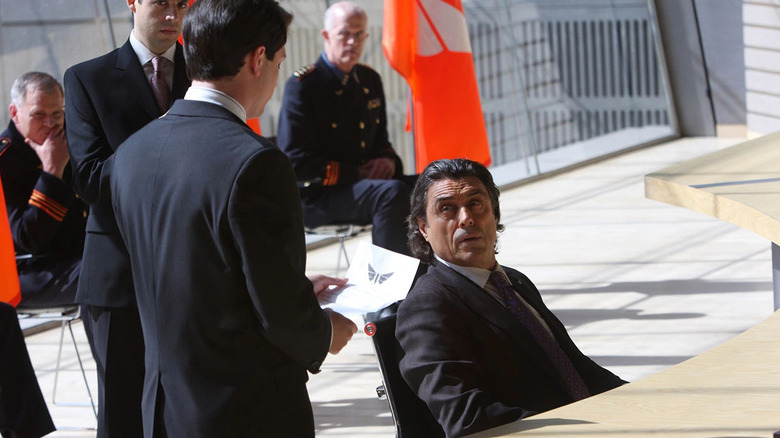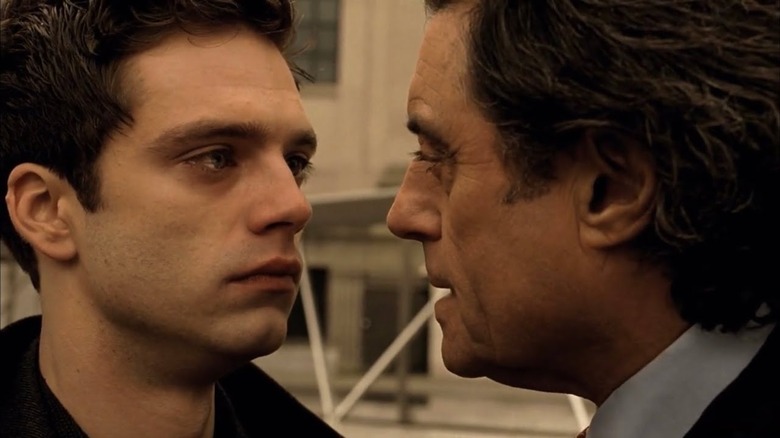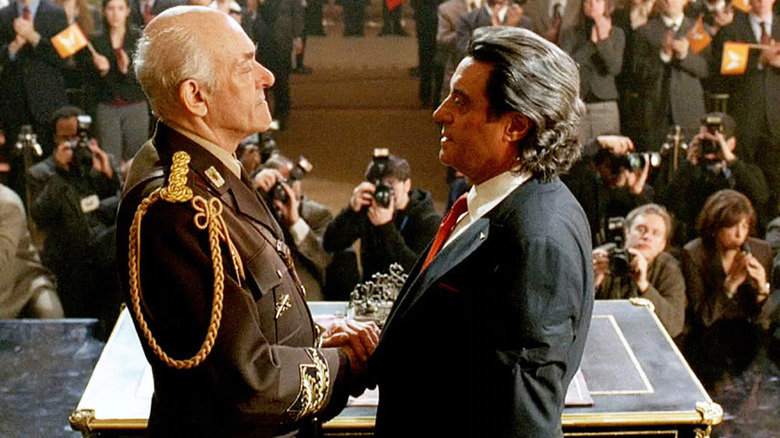TV, Interrupted: Kings Was A Contemporary Biblical Retelling That Never Got Its Day Of Judgment
(Welcome to TV, Interrupted, a series where the /Film team remembers, eulogizes, and makes a case for the revival of TV shows we loved that were canceled far too soon.)
I usually avoid watching TV shows that were prematurely canceled. I like stories to have resolution and don't want to invest when I know I won't be getting that. I was surprised when I decided to give "Kings" a shot, but two things won me over. For one, the "Deadwood" fan in me loves nothing more than Ian McShane belting out theatrical dialogue. Second, the premise of the series is so unique that I just couldn't resist the draw.
"Kings" is a remarkably high concept series: a retelling of the story of King David in the modern-day. In the fictional nation of Gilboa, soldier David Shepherd (Christopher Egan) rescues Prince Jack Benjamin (a pre-Bucky Sebastian Stan) from the warring nation Gath, destroying a Goliath tank along the way. David finds himself welcomed to the capital of Shiloh as a guest of King Silas (McShane). A wide-eyed patriot like David is out of place in the world of politics, especially one headed by a king who fears losing his crown above all else.
The series was developed by screenwriter Michael Green, who drew on his Jewish heritage for both the story's inspiration and the religious themes. "Kings" aired for a mere four months on NBC in mid-2009, running for only 13 episodes before cancellation. Egan's David never became King David. Watching, though, I was glad to have taken the journey, but still left wistful for an ending that wouldn't be coming.
Why Kings was great
This may be the story of David, but Silas is the star of the show. Once a poor soldier, Silas received a message from God when a swarm of monarch butterflies landed upon his head in the shape of a crown. He united three warring nations into Gilboa, but as with all men who accumulate power, he's now more concerned with keeping what he's garnered than using it to affect change. At the end of the pilot, when he sees butterflies land upon David's head as they once did his, he decides to keep his friend close lest he becomes an enemy.
Ian McShane has natural magnetism and charisma which would make any actor envious, Whether funny or furious, he's always watchable. McShane brings to Silas the same mix of wit and danger that made Al Swearengen such a memorable antihero. When he offers David anything up to "half his kingdom" for saving Jack's life, he notices David eying Princess Michelle (Allison Miller). Silas only sighs, "Half my kingdom it is." This becomes much less funny in the back half of the series; after Silas discovers David and Michelle's relationship, he interprets it as a sign of David wanting to usurp him. Thus, he has David framed for treason and rigs the trial to send him to execution.
McShane is aided by a great supporting cast. Susanna Thompson plays Queen Rose as a great Lady Macbeth, dominating with whispered advice not just to her husband but their children too. Dylan Baker is a delicious slimeball as William Cross, the queen's industrialist brother, and the money power behind Gilboa. Sebastian Stan holds his own as the prince, a man just as ambitious as his father. Instead of being grateful to David for saving his life, Jack can only see him as a rival. Jack is also in the closet, and he must stay that way if he ever hopes to take his father's throne. Stan is best at playing cock and weepy, two modes that totally fit Jack. Beyond that, his limited range actually works for a character who's so deeply repressed.
Eammon Walker plays the Reverend Samuels, the emissary through which Silas communicates to God. At the other end of divinity lies Brian Cox as the deposed king Vesper Abadon, now imprisoned in solitary confinement. When pressed, Silas goes to Abadon for advice he can't get elsewhere; advice from a fellow king. Cox and McShane are in a league of their own and their scenes together are a marvel.
Despite the Biblical trappings, "Kings" wasn't afraid to broach the modern-day. The politics are mostly rather topical for 2009; subplots of Michelle trying to get a healthcare bill passed or William pushing Silas to continue the war with Gath so his company may reap further profit stand out as ripped from the headlines of the aughts. Some of the other politics are more prescient; episode 7, "Brotherhood," features a B-plot about Silas trying to contain a plague from spreading across Shiloh.
"Kings" used visual storytelling in ways most network dramas simply aren't willing to. Most importantly, there's the overarching symbolism of the monarch butterfly; indeed, the final shot of the series is a butterfly fluttering through the trees of a Gilboan forest. The symbolism is two-fold. For one, the meaning behind them specifically being monarch butterflies that adorned Silas and David's heads are obvious. What's the main thing butterflies are known for? Chrysalis, the ultimate natural change. Just as Silas once reshaped Gilboa, now God is calling David to do so again.
If there's a weak link, it's David himself. "Kings" suffers from what I call "Gangs Of New York" syndrome; a younger lead is outshined by a veteran character actor playing an older antagonist. Try as he might, Egan simply can't keep up with McShane, a problem especially noticeable due to how many scenes they share together. Ditto Miller as Michelle, which means the romance she shares with David just doesn't grab the same way Silas' soliloquies or the supporting cast's various machinations do.
Still, the characters on the page are more compelling than their actors often were. Given more time, Egan and Miller could've grown into their roles. The series' cancellation means they didn't get the chance.
Why Kings was canceled
Shortly after the premiere, "Kings" was deemed "as good as canceled already." After the first six episodes failed to garner a wide audience airing on Sundays, NBC put the series on hiatus. It didn't take long for the series to be canceled, with the remaining episodes being burned off on Saturday nights from June 13 to July 25.
For one, the series stumbled out of the gate; the two-hour premiere was watched by about six million viewers, lower than expected. These low ratings likely had a feedback effect; the series premiered to low numbers, prompting reports that the series will likely be canceled. Viewers naturally will be less inclined to tune in for a doomed series, driving the ratings lower still.
Worse, the show was reportedly expensive to produce, making high ratings even more of a necessity than usual. Though Green denied the cost was prohibitive, the budget for the pilot was reported at $10 million, followed by $4 million for each subsequent episode.
As for why the show never picked up an audience, that is believed to go back to the marketing. Trailers downplayed the religious aspects and struggled to articulate what the show was even about; these two choices are doubtlessly related.
Shortly after the cancellation, Green wrote:
"The network had no negative reaction at any stage to religious content within the show. In fact, they encouraged it and found it hopeful. It was only when time came to market the show that a decision was made not to promote the show as a biblically inspired tale. Fear of reprisal from the religious audience was the described cause. Something NBC has had bad experiences with before. As such, any references to "King David" were actively avoided, in favor of the limited marketing campaign that many of you saw and have commented on with derision. Some of that promotion gave the misleading impression that the nation of Gilboa was somehow tied to American history. This was never part of the show's premise or execution in any way."
Ultimately, "Kings" was probably too ambitious for NBC. It would've been better served on a Cable network, namely HBO or Showtime, the usual homes of prestige programs with movie star casts.
Unfinished business
While the show's conclusion went unrealized, it was pre-ordained; David would become King of Gilboa, as his Biblical counterpart had of Israel. Yet, as Silas warns Jack in episode 1, "We give up what we want when we want power." What would David have to sacrifice to achieve his destiny? We'll never know.
The cancellation also deprived us of more direct scripture adaptations filtered through the modern lens of "Kings." One can only wonder how the series would've reinvented the story of Bathsheba, where King David sends a man named Uriah to his death because he lusts for Uriah's wife. Such a move seems most out-of-character for David Shepherd, but it's also the most famous story of King David behind his slaying of Goliath. After David ascended to the throne, would he have become corrupted like Silas? Power corrupts absolutely, after all.
Beyond the Biblical inspirations, threads woven during the series itself will never be completed. The last minutes of the finale are table-setting for the non-existent season 2, Silas declares he is now at war with God, a path that could only lead to his downfall. David goes into hiding in Gath, while a pregnant Michelle is imprisoned by her parents. After Jack and William launch a failed coup, the former prince is ordered to produce a replacement heir for his father while the latter flees the country. At the same time, William's son Andrew (Macaulay Culkin) betrays his father to ingratiate himself to Silas.
There were ongoing subplots that were meant to lead to more as well. In episode 8, "The Sabbath Queen," it's revealed that Silas made a deal with the Angel of Death (Saffron Burrows) to save Michelle's life; he would abdicate when God requested it. With Silas declaring the Lord his enemy in the finale, it seems likely Burrows would've made a come-back. In episode 3, "Prosperity," Silas blackmails Abaddon into revealing the location of his hidden gold with the promised safety of someone the old king cares for. Who this person is goes unsaid.
Most importantly, there's the series' main subplot: Silas' secret family. The series makes clear that Silas married Rose to secure William's pocketbook; his true heart lies with Helen Pardis (Sarita Choudhury), with whom he has a young, sickly son named Seth. The people of Gilboa discovering their king's second life, and the ensuing scandal, was a ticking time bomb; the cancellation put out the fuse.
Will Kings ever return?
Almost certainly not. For one, there's been no talk of a revival since the series went off the air. Second, it's been almost 15 years since the series ended. For a series to return after that long a dormancy, it would need a large fanbase, something "Kings" doesn't have. Even retrospectives declaring "Kings" in need of more love (such as this one here) haven't done much to create a tangible audience.
While Egan never broke out of obscurity, many of the other actors have moved on. Sebastian Stan's fortunes have been quite good since he joined the MCU, while Brian Cox found better luck on TV with "Succession." Green himself has also since graduated to film writing; in 2017, he co-wrote "Logan" and "Blade Runner 2049," and since then has had steady Hollywood work. He and McShane teamed up once more for an adaptation of Neil Gaiman's "American Gods," but that itself became a case of "TV, Interrupted."
Oh well. If anyone is truly desperate for a conclusion, there's always the Book of Samuel to read. As for "Kings" itself, it's free to watch on NBC and available at pretty cheap prices elsewhere, such as Amazon Prime and YouTube.




